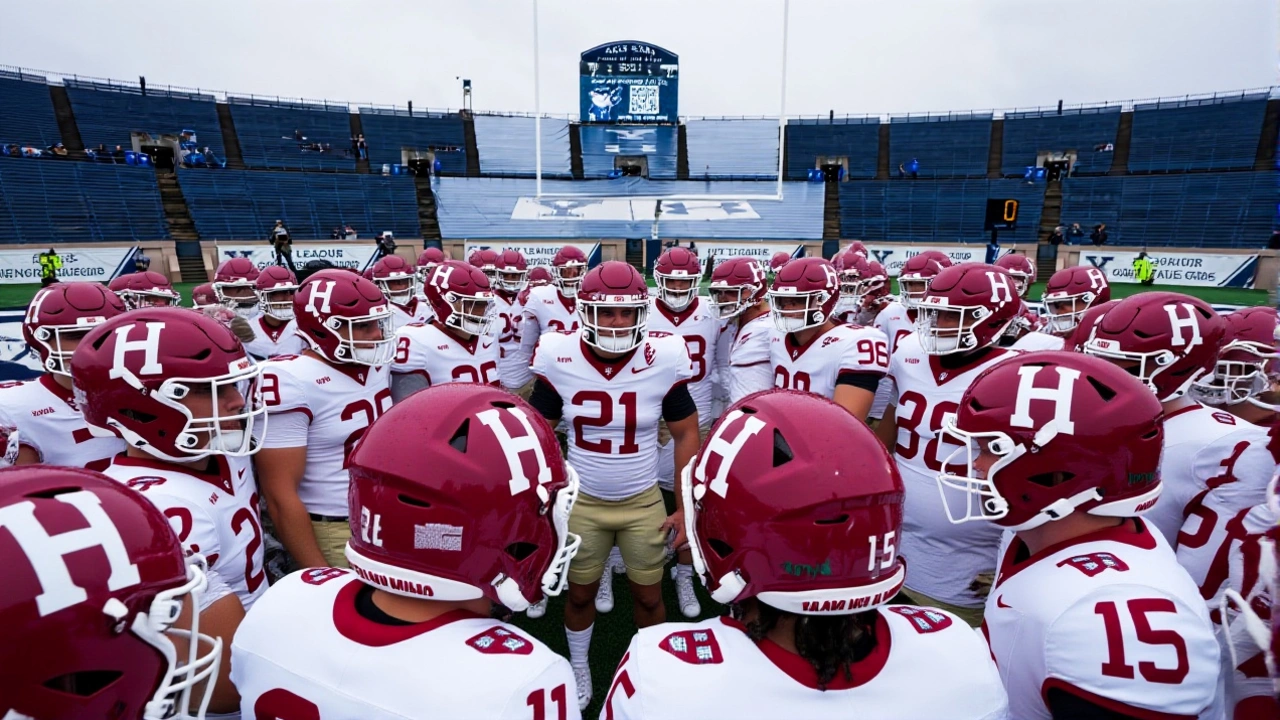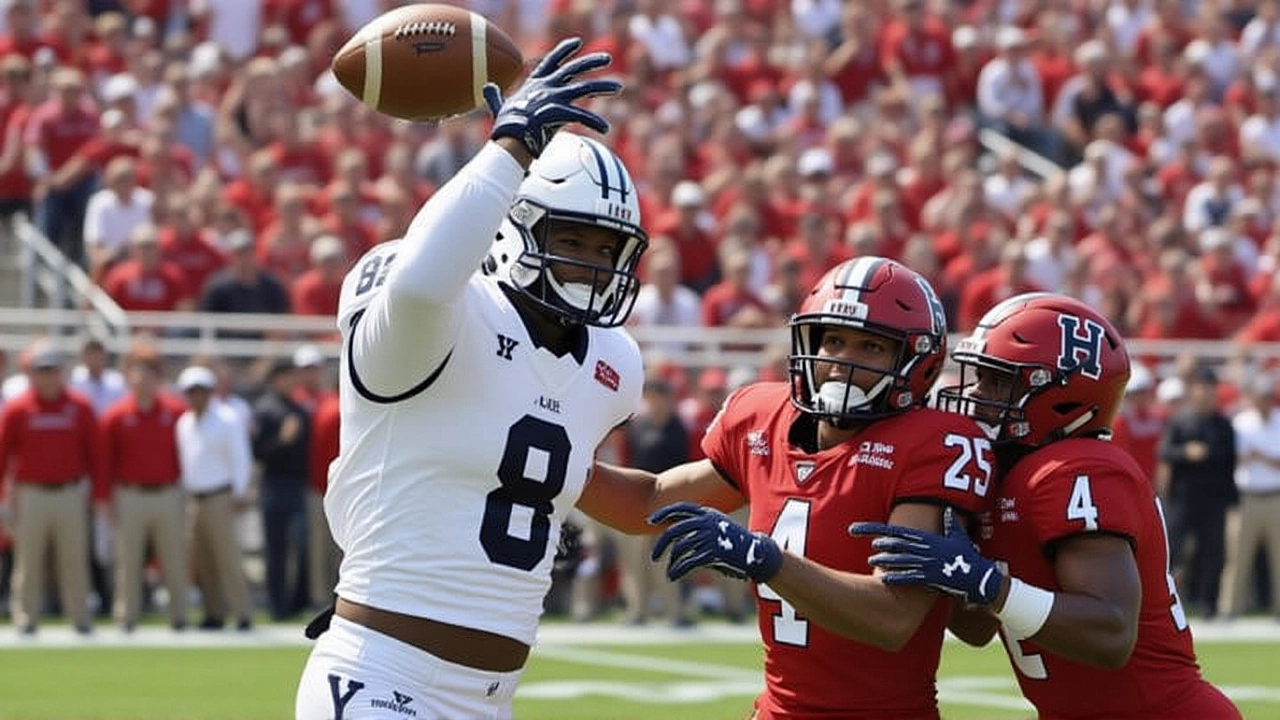Yale football didn’t just win The Game — they rewrote history. On Saturday, November 22, 2025, the Yale Bulldogs crushed the Harvard Crimson 45-28 at the Yale Bowl in New Haven, Connecticut, claiming their fourth straight victory in the century-old rivalry and, more importantly, securing the Ivy League’s first-ever automatic bid to the NCAA Football Championship Subdivision playoffs. It wasn’t just a win. It was a seismic shift in a rivalry that’s shaped college football since 1875.
From Disaster to Dominance: Yale’s Opening Strike
The game didn’t even have time to warm up before Yale struck. Just 18 seconds after kickoff, Harvard senior quarterback Jaden Craig floated a pass to senior receiver Dean Boyd — and it was stripped by Yale linebacker Brandon Webster. The ball bounced into Webster’s hands, and he rumbled 21 yards for a touchdown. The Yale Bowl erupted. By the time Harvard’s offense had huddled for its second play, Yale was already up 7-0. It was a statement: this wasn’t going to be another close call.
Yale quarterback Dante Reno didn’t let up. He finished with 287 yards and three touchdown passes, including a 12-yard strike to Lucius Anderson with 14:56 left in the fourth quarter that put the game out of reach at 45-20. The Bulldogs’ offense, averaging just 28.3 points per game coming in, exploded for 45 — their highest total in the rivalry since 2009.
Harvard’s Struggles and the Weight of History
Harvard entered the game ranked No. 10 nationally, riding a nine-game winning streak and boasting a 9-1 record. Their defense had been stellar — until Saturday. Sean Line racked up a career-high 15 tackles, and Ty Bartrum added 14, but it wasn’t enough. Yale’s offensive line controlled the trenches, and Reno found seams in Harvard’s secondary that hadn’t been exposed all season.
Harvard’s only real spark came late, when Craig connected with Brady Blackburn on a 31-yard touchdown pass to cut the deficit to 45-28. But the damage was done. The Crimson’s offense, which had averaged 34.7 points per game, managed just 28 — and 20 of those came after Yale had already built a 25-point lead.
For Harvard’s Class of 2026, it’s a bitter reality: they’ve never won The Game. Four straight losses. The first such streak since 1947. The weight of that history hung over the locker room. Head coach Andrew Aurich was gracious but candid: "They came out there and they did everything that we had been doing for nine weeks. What they did, that was really impressive."
More Than a Rivalry: The Playoff Revolution
For the first time in Ivy League history, the conference champion earns an automatic berth in the FCS playoffs. No longer do teams have to pray for an at-large bid. No more debates over strength of schedule or computer rankings. The winner of The Game — or whoever finishes atop the league — goes straight to the postseason. Yale, at 8-2 overall and 6-1 in the Ivy League, clinched that historic spot. Harvard, also 6-1 in conference play, finished tied for first but missed out on the automatic bid because Yale won the head-to-head matchup.
This change, implemented in 2024 after years of lobbying by Ivy League athletic directors, was meant to elevate the conference’s national profile. On Saturday, it delivered. The NCAA selection committee now has to decide whether Harvard’s 9-1 record, including wins over Princeton and Brown, merits an at-large bid. That decision comes Sunday, November 23, 2025, at noon Eastern Time on ESPNU.

The Human Side: Politics, Predictions, and Postcards
Even before kickoff, the atmosphere was electric — and oddly political. Connecticut Senator Richard Blumenthal (LAW '73), a Yale alum, showed up at the joint tailgate with postcards and stickers reading "Stand Up for Yale" and "Crimson Courage." He told Harvard students: "I know you're focused on The Game, but this is no game." He was referencing federal funding threats to higher education — and subtly reminding both schools that their rivalry mustn’t overshadow their shared mission.
Yale President Maurie McInnis had predicted a 31-27 Yale win before the game. Dean of Yale College Pericles Lewis went with 24-21. Neither came close. But their confidence? That was on point.
What’s Next? The Legacy of a New Era
Yale’s win doesn’t just end Harvard’s winning streak — it ushers in a new chapter. The Ivy League is no longer a footnote in FCS football. It’s a legitimate pathway to the national stage. Yale, under head coach Tony Reno (no relation to Dante), has now won four in a row — a feat not seen since the 1950s. The Bulldogs’ defense, led by sophomore standout Ezekiel Larry (who sacked Craig on first down), held Harvard to just 312 total yards — a season low.
Harvard, meanwhile, faces a long offseason. Their best players — Craig, Line, Bartrum — are graduating. The question isn’t just whether they’ll get an at-large bid. It’s whether they can rebuild fast enough to challenge Yale again.
For Yale, the celebration will be loud. But the real victory? They didn’t just win a game. They changed the rules of the game.
Frequently Asked Questions
How did Yale earn the Ivy League’s first automatic FCS playoff bid?
Yale earned the automatic bid by winning the head-to-head tiebreaker against Harvard, despite both teams finishing 6-1 in Ivy League play. The NCAA’s new rule, implemented in 2024, grants the conference champion — determined by head-to-head results in the case of a tie — an automatic berth. Yale’s 45-28 victory in The Game on November 22, 2025, sealed their claim.
Why is Harvard still eligible for the FCS playoffs despite losing?
Harvard’s 9-1 overall record and 6-1 Ivy League mark, including wins over top-tier opponents like Princeton and Brown, make them a strong candidate for an at-large bid. The selection committee evaluates strength of schedule, quality wins, and overall performance. Harvard’s nine wins are their most since 2015, and they were ranked No. 10 nationally before the game.
Has any other Ivy League team ever made the FCS playoffs?
Yes — but never as a conference champion. Princeton made the playoffs in 2022 as an at-large team after going 9-1, and Penn did so in 2021. But this is the first time an Ivy League team has earned an automatic bid, thanks to the NCAA’s 2024 rule change that gave the conference its own qualifying slot, aligning it with other FCS leagues.
What does this mean for the future of Ivy League football?
It’s a game-changer. The automatic bid raises the stakes of every conference game, especially The Game. Schools will now recruit more aggressively, invest in facilities, and prioritize football as a pathway to national exposure. Yale’s win proves Ivy teams can compete with — and beat — nationally ranked opponents, potentially attracting more media attention and higher-profile matchups in future seasons.
Why is the Yale Bowl significant in college football history?
Opened in 1914, the Yale Bowl is the first stadium in the U.S. built in the bowl shape that inspired modern stadiums like the Rose Bowl and the Los Angeles Memorial Coliseum. It’s hosted over 140 editions of The Game since 1875, making it the longest-running rivalry in college football. Its historic architecture and intimate atmosphere give it a unique place in American sports culture.
What’s the record for most wins in The Game series?
As of 2025, Harvard leads the all-time series 53-51-8. But Yale’s four straight wins since 2022 have narrowed the gap dramatically. Before this streak, Harvard had won 11 of the previous 13 meetings. The 2025 victory marks Yale’s first four-game winning streak in the rivalry since 1955–1958, signaling a potential shift in momentum.
